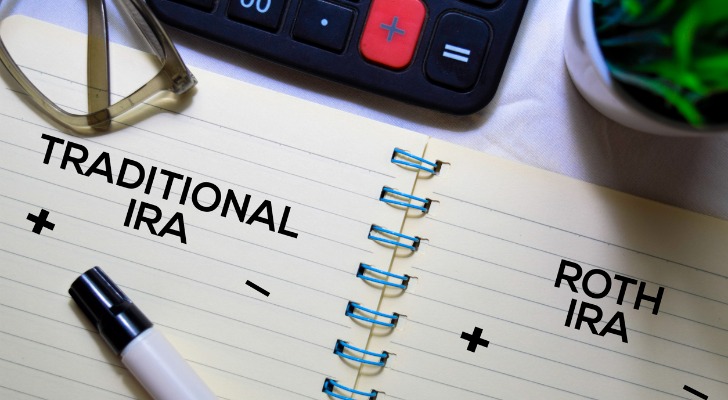Legally, it’s never too late to make a Roth conversion. The IRS will let you move qualifying funds at any time as long as you can pay the resulting tax bill.
For those in or near retirement, the bigger question is whether it’s a wise call to make a Roth conversion. On the one hand, a tax-free portfolio gives you significantly more control over your finances. On the other hand, you will have little opportunity to capitalize on the advantages of post-tax growth.
A financial advisor can help you build a retirement plan that accounts for taxes, cost of living, retirement accounts and more. Speak with an advisor who serves your area today.
What Is a Roth Conversion?
A Roth IRA is what’s known as a “post-tax” retirement account. This is as opposed to the more common tax-deferred accounts, like a traditional IRA or a 401(k).
With a pre-tax portfolio, you receive a tax deduction for all qualified contributions as you make them during your working years. This makes it cheaper tax-wise to contribute to your retirement account, allowing you to invest more with the same amount of income. Then, in retirement, you pay income taxes on your withdrawals.
With a post-tax Roth IRA, you receive no tax deduction for qualified contributions. That means you’re contributing money that you’ve already paid income taxes on. This makes it more expensive to contribute to your retirement account in the short term, which effectively reduces the amount of income you can invest now. But then, in retirement, you pay no taxes on any withdrawals, including the returns your investments have earned.
A Roth conversion is when you move assets from a qualified pre-tax account to a post-tax Roth IRA. You can only convert money from tax-deferred retirement accounts. Once you convert money to a Roth IRA, it follows the rules of a post-tax Roth account and enjoys all of the untaxed growth. However, you’ll need to be prepared to pay taxes on that money, as it’s now transitioned to a post-tax account. On the bright side, Roth IRAs do not require RMDs, which can be a boon for retirees.
Unlike annual contributions, there is no limit on Roth conversion frequency or amounts. You can convert as much money as you would like and as often as you choose.
Roth Conversions and Taxes
The potential for untaxed growth makes a Roth IRA very valuable, but it comes with significant up-front costs. Since this money is coming from a pre-tax portfolio, when you take a Roth conversion you must add the entire amount converted to your taxable income for that year.
Using this example, say that you hold $745,000 in a 401(k). If you convert this amount in one lump sum, you would add $745,000 to your taxable income for that year and would, as a result, owe state and federal taxes on the entire amount. While there are ways to manage this, most often by structuring your conversions to stay within lower tax brackets, there is no way to entirely avoid paying income taxes on converted funds.
Depending on the amounts in question, this can make a Roth conversion very expensive. As a result, for households considering a conversion, the rule of thumb is generally this:
- A Roth IRA is most valuable earlier in life, when you have more time to enjoy its untaxed growth. It is also most valuable when you currently pay a lower tax rate than you will pay at withdrawals, since that allows you to pay the current lower rate in exchange for avoiding the future higher rate.
- A pre-tax portfolio is most valuable when you currently pay a higher tax rate than you will pay in retirement, since the tax-deferred nature of the account allows you to save on your current higher rate in exchange for paying the lower rate in the future.
If you want help building a retirement income plan, consider speaking with a financial advisor today.
Making a Roth Conversion in Retirement

There are many ways to manage your 401(k) when you retire, and converting the portfolio to an IRA is one common approach. In this process, you can elect to move your 401(k) to either a traditional IRA or a Roth IRA.
However, all Roth IRA contributions are subject to a cooldown period. So if you contribute funds to a Roth IRA in or near retirement, be sure to plan for not being able to access that money for at least five years. If you do withdraw before then, you’ll be subject to a 10% early withdrawal penalty.
According to Tim Maurer, Chief Advisory Officer at the wealth management firm SignatureFD, a retirement conversion can sometimes be a good strategy.
“[E]arly in one’s retirement can be one of the best times to consider a Roth conversion, when presumably one’s taxable income dips down relative to those higher-earning years later in one’s career and may also be lower than later in retirement when RMDs force retirees to take taxable income,” he said.
But, Maurer said, don’t make a conversion just for the sake of it. You should have a purpose and strategy to justify the significant up-front costs. Beyond “tax arbitrage,” that is taking advantage of lower rates now compared with higher rates later, Maurer suggests three main reasons a current retiree may want to consider converting their savings:
- You never have to take RMDs with a Roth IRA, which can further enhance the benefits of compound interest growth.
- Diversification of income tax liability is inherently valuable in retirement, particularly for making larger purchases. If you want to fund something like a new car or a big trip, instead of risking a higher tax bracket by pulling extra money from a pre-tax account you can dip into the Roth IRA tax-free.
- Maurer also says, “there may be no better gift an heir could receive than a Roth IRA.” While a pre-tax retirement account balance leaves taxes also for your heirs, a Roth IRA leaves them a clean, tax-free asset.
The question, he said, is how much value each of these issues holds for you. That’s important for each household to determine for themselves.
You can save significantly on a Roth conversion by staggering your conversions, which, given the five-year rule, could be helpful anyway. Given this retiree’s relatively low Social Security income, they would have a lot of room for relatively low-tax conversions each year.
Still, even accounting for the reduced taxes of a Roth IRA, this household doesn’t stand to gain a lot of immediate benefit from converting their savings. Unless their tax situation would change considerably in retirement, or if they have other assets, it’s unlikely that they would see a significant tax benefit to offset their conversion costs. A Roth IRA might be effective if, as Maurer suggests, they are looking for tax diversity or a strong estate plan. But it’s important to make that plan before physically moving any money around.
Roth IRA Tips
- A financial advisor can help you build a comprehensive retirement plan. Finding a financial advisor doesn’t have to be hard. SmartAsset’s free tool matches you with up to three vetted financial advisors who serve your area, and you can have a free introductory call with your advisor matches to decide which one you feel is right for you. If you’re ready to find an advisor who can help you achieve your financial goals, get started now.
- A Roth IRA is typically a self-managed portfolio, meaning that you need to select and balance your own investments. While everyone’s needs are different, here are a few places to start.
Photo credit: ©iStock.com/LaylaBird, ©iStock.com/syahrir maulana
